By Nancy Crotti
Both William Mitchell and Hamline Law made it possible for people to earn a law degree without giving up work or other commitments. Hamline created Minnesota’s first and only weekend enrollment option in 2001, while Mitchell was founded in 1900 as a night school and only added a full-time day schedule in the late 1970s.
That tradition of access to a legal education continues under Mitchell Hamline, but with some pioneering updates.
The Hybrid J.D. program—a partly online, partly on-campus option—launched in 2015, and the technological platform and pedagogy developed for it are being applied in new ways to provide additional flexibility to students in new enrollment options. The weekend program, for instance, is now partially online, so students travel to campus only every other weekend. And a new Executive J.D. option allows students to complete their degrees partially online with two visits to campus per semester.
The format, schedule, and learning interface of today’s part-time programs might not look familiar to a Mitchell or Hamline student of the 1970s or ’80s or ’90s, but the rigor, the connections between students, and the appreciation for a law school option that fits around one’s life are much the same today as they were then.
Below are glimpses of six students—three former and three current—that illustrate how the innovative part-time programs available today allow students to accomplish their goals just as the earlier part-time programs did in their day.
Julie Finch: Evening
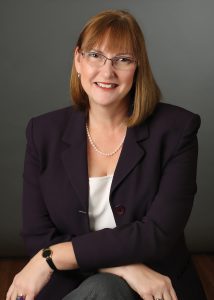 Julie Finch ’87 chose the night program at William Mitchell so she could find a law-related job during the day, and it turned out to be a fortunate decision. Finch landed a law clerk job in software licensing at Honeywell as a 2L because she did well in contracts and could work daytime hours.
Julie Finch ’87 chose the night program at William Mitchell so she could find a law-related job during the day, and it turned out to be a fortunate decision. Finch landed a law clerk job in software licensing at Honeywell as a 2L because she did well in contracts and could work daytime hours.
Finch also knew how software licensing worked because her husband and several friends were software engineers.
“I knew the language and the concepts, even if I didn’t know the legalities of it,” Finch said. “It was a brand new area of law.”
Finch was one of the early presidents of the Student Intellectual Property Law Association at William Mitchell. She had study groups at school and with other law clerks at Honeywell.
“We really did feel free to call on the expertise of the lawyers who were in the department,” she added. “We had the opportunity to pick their brains and see things in real-life operation.”
Finch went on to work in IP at Honeywell for 10 years, followed by stints at the state attorney general’s office and two law firms. Just before the second firm, Rider Bennett, dissolved in 2007, she started a branding, copyright, social media, and start-up business law firm from her Apple Valley, Minn., home. Her clients range from IT companies to the fashion industry.
“It has all really worked out well for me,” Finch said. “Every phase of practice has had its own challenges and its own great things. I am set up to do this for a very long time.”
Sarah Dannecker: Evening
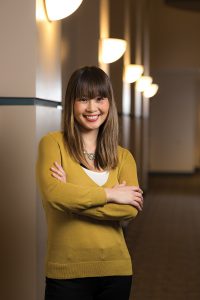 Sarah Dannecker wanted to start law school right after graduating from Hamline University in 2004, but life got in the way.
Sarah Dannecker wanted to start law school right after graduating from Hamline University in 2004, but life got in the way.
Dannecker became pregnant and had to work full-time to support herself and her son. She landed a job at a Minneapolis intellectual property law firm and then became the contracts manager at Ecolab in Eagan, Minn. Dannecker recently left that job and will begin a position as a summer associate with a general practice firm in May 2018. At 35, she is a 2L at Mitchell Hamline, attending evening classes part-time. Next semester, she will attend school full-time while working as a law clerk.
Dannecker studies in the time between work and school and all weekend, except for Fridays, when she takes a break. The evening program accommodates her lifestyle and learning style.
“I really need my butt in the seat with the professor in front of me,” Dannecker said. “I learn best being at the school.”
She enjoys corporate law and property law, though she says she hasn’t settled on a career path yet. She also enjoys the camaraderie among the evening-school students, most of whom are in their 30s and 40s.
“We’re all in the same boat together, we have the same stressors,” she said. Her son, now 14, is proud of her for attending law school, but her friends are another story.
“The reaction most people give is, ‘Are you nuts?’” she said with a laugh.
But Dannecker is grateful for the opportunities she’s had.
“I didn’t have to quit my job in order to go to law school,” she said. “That for me was a really nice feature of Mitchell Hamline.”
Tamara Cabán-Ramirez: Weekend
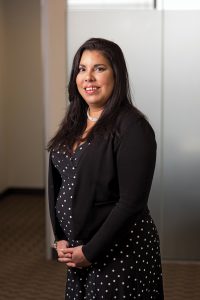 By the time she began law school at Hamline University in 2001, Tamara Cabán-Ramirez ’04 was long accustomed to being among the youngest in her class. She began kindergarten in Bayamón, Puerto Rico, at age 4, and started at the University of Minnesota at 16.
By the time she began law school at Hamline University in 2001, Tamara Cabán-Ramirez ’04 was long accustomed to being among the youngest in her class. She began kindergarten in Bayamón, Puerto Rico, at age 4, and started at the University of Minnesota at 16.
At age 24, Cabán-Ramirez enrolled in the first weekend program cohort of Hamline’s law school. At the time, she was working as a paralegal in the immigration department at Rider Bennett, and a colleague told her about this new program Hamline was launching that would let her earn a J.D. while continuing to work full-time.
Most of her classmates were older, married, had children, and were pursuing second careers. She loved it. “It was an enriching experience because people had had experience in the workplace,” she said. “That is one of the things that I truly appreciated. People had been out there, they had jobs to do, they had families to take care of.”
Her classmates had a different approach to learning and to classroom collaboration than she had encountered in previous school settings. There was little feeling of competition, and more interesting discussions.
Cabán-Ramirez worked full-time at Rider Bennett during law school. She studied anytime she could, finishing in 3½ years. She now has her own immigration and criminal law practice, and her old law school study group still gets together, refers cases to one another, and works together.
Mike Wells: Weekend
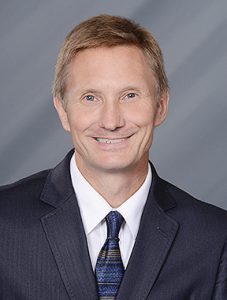 Mike Wells drives seven hours one way every other weekend to attend classes at Mitchell Hamline, camping or staying in military housing to save money on hotels. The rest of the time, he’s working online.
Mike Wells drives seven hours one way every other weekend to attend classes at Mitchell Hamline, camping or staying in military housing to save money on hotels. The rest of the time, he’s working online.
At 51, Wells has dreamt of law school for half a lifetime. He was accepted to Creighton University School of Law in 1992, but only to the full-time program, and he had to work full-time to support his family.
Wells went on to earn a master’s degree and a Ph.D. He’s still working full-time, now as a school principal and superintendent in rural Hamburg, Iowa.
He appreciates that the weekend program involves seven weekends on campus each semester, because he learns best in the classroom. Internet service at his home is spotty, so for big projects he’ll sometimes go into work. He says most nights he’s working on schoolwork till midnight or 1 a.m.
Wells plans to retire in four years and volunteer his services as an attorney for people in need, including in criminal defense.
“We want to do God’s work and help people,” he said of himself and his wife, “and that’s something that Mitchell Hamline is really good about. They are very good about giving back to the community, helping others.
“Without Mitchell Hamline’s program, there’s no way I could have done this,” he added. “I really am grateful, and I appreciate the opportunity. Now I just have to pass everything.”
Jake Crandall: Evening
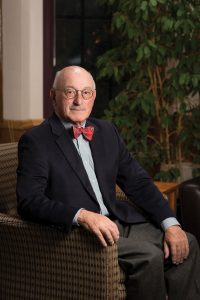 Jake Crandall ’73 planned to work in labor law, return home to Austin, Minn., and run for the state Legislature.
Jake Crandall ’73 planned to work in labor law, return home to Austin, Minn., and run for the state Legislature.
Instead, he ended up retiring as president and CEO of the American Automobile Association of Minnesota in 2004 after 30 years of service—all because a professor took a personal interest in him. Crandall was working his way through law school, taking evening classes and loading trucks overnight at UPS when a professor suggested he put his legal education to better use.
That professor, now retired Minnesota Court of Appeals judge and former state Sen. Jack Davies, sent young Crandall to apply for a job at the Capitol. Crandall managed the Senate index, and through that experience he learned the legislative process and met some of the state’s most influential people. Had he not attended night school at William Mitchell, Crandall doubts he would have had the chance to work at the Legislature or at AAA.
Later, because of his experience in the Legislature and his role as general counsel to AAA’s Minnesota chapter, he was appointed by Gov. Wendell Anderson to help craft the state’s no-fault auto insurance bill.
“The real strength of Mitchell Hamline was that as a student I had real-life experience—with lawyers, legislators, and clients,” Crandall said. “Those experiences strengthened my law school education.”
Martin Prego: HYBRID J.D. program
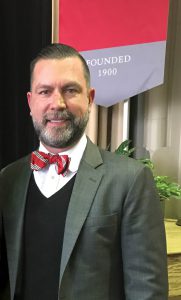 Growing up in Buenos Aires, 3L HYBRID J.D. program student Martin Prego knew he wanted to be a lawyer. He also wanted to live in the United States, so going to law school in Argentina didn’t make sense.
Growing up in Buenos Aires, 3L HYBRID J.D. program student Martin Prego knew he wanted to be a lawyer. He also wanted to live in the United States, so going to law school in Argentina didn’t make sense.
Prego won a full scholarship in 1996 to the University of Miami for a master’s degree in international relations. He took a job with Merrill Lynch as a way to remain in the United States, and he put aside his dream of becoming a lawyer.
Prego is now senior vice president and group chief compliance officer for a Miami bank and its subsidiaries and president of the bank’s wholly owned broker-dealer. When his daughter was born three years ago, he realized he couldn’t teach her to pursue her dreams if he didn’t pursue his own.
He investigated part-time programs in the Miami area but needed more flexibility to accommodate his schedule. With the HYBRID J.D. program, Prego is able to study online after he puts his daughter to bed each night.
“This is a fantastic program for many reasons for someone who wants to go full-time but also have a full-time life in terms of having a job and family,” he said.
Prego’s classmates in the HYBRID J.D. program include a vast array of professionals, doctors, entrepreneurs, a former mayor, and business people.
“I’m learning so much, not only from the faculty but also from each other,” he said. “Everyone has such an impressive resume.”
And the exposure to new things has sparked a new interest for Prego. “I’ve been bitten by the litigation bug,” he said. “It was not expected, but I love it.”
Nancy Crotti is a freelance writer, editor, and speechwriter in St. Paul.
